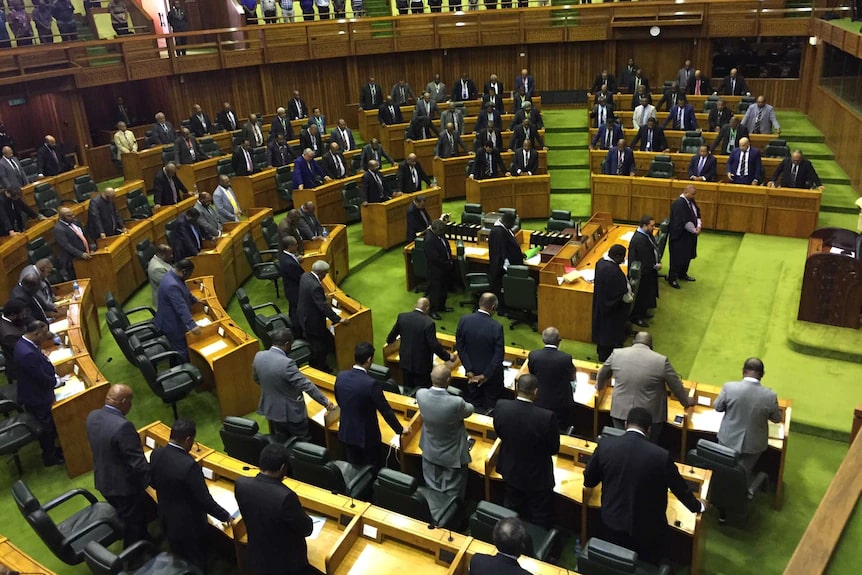PNG Political Crises

A chronology of key events
Political crisis
2019 30th May- James Marape Elector New Prime Minister
2017 November – Australia closes a detention center in Papua New Guinea, but hundreds of asylum seekers refuse to move.
2017 August – Prime Minister O’Neill wins another term in elections.
2016 December – China agrees to spend nearly 4bn US dollars to build a giant industrial park in Papua New Guinea.
2016 November – Australia says refugees held in detention centers in Papua New Guinea and Nauru will be resettled in the United States in a “one-off deal”.
2016 July – Prime Minister Peter O’Neill survives a no-confidence vote in parliament over corruption allegations following weeks of protests calling for his resignation.
2016 April – Government says it will close the Australian detention center on Manus Island after the Supreme Court rules that detaining asylum seekers at the facility is unconstitutional.
2016 February – Police shoot dead 12 prisoners following a jail break by over 90 inmates at a prison in the city of Lae.
2015 October – Government says it will begin resettling refugees being held in the country in Australian-run detention centres.
2015 January – Government denies reports that protests at an Australian immigration centre on Manus Island turned violent after 400 detainees reportedly went on hunger strike.
2014 June – Prime Minister O’Neill disbands the country’s main anti-corruption body, Taskforce Sweep.
2014 June – An arrest warrant is issued for Prime Minister Peter O’Neill after the national anti-corruption watchdog accuses him of authorising fraudulent payments by the government to a Port Moresby law firm. Mr O’Neill challenges the warrant in multiple court cases.
2014 November – Prime Minister O’Neill is referred to a tribunal of judges over allegations of misconduct in office relating to a $1.3 billion loan.
2014 April – Paul Tiensten, a former senior minister and current MP, is sentenced to nine years imprisonment for misappropriating millions of dollars of public funds. The sentence is the most severe yet in PNG for a corrupt public official.
2014 March – Papua New Guinea’s Supreme Court begins a human rights inquiry into Australia’s immigration detention centre on Manus Island. The probe will assess whether the centre’s conditions meet human rights requirements under PNG’s constitution.
2014 February – Violence at Australia’s immigration detention centre on PNG’s Manus Island leaves one asylum seeker dead and 77 injured.
2013 September – Two guides are killed when a group of Australian and New Zealand hikers and their local porters are attacked by machete-wielding robbers on PNG’s Black Cat Track.
2013 July – Papua New Guinea agrees to provide offshore processing for asylum seekers who reach Australia by boat. Under the deal, asylum seekers whose refugee claims are upheld will be settled in PNG. Australia pledges to grant Papua New Guinea generous aid in return, and the processing centre on PNG’s Manus Island will be significantly expanded to hold up to 3,000 people.
2013 May – Following a series of brutal public killings, the controversial 1971 Sorcery Act – which acknowledged the accusation of sorcery as a plausible defence in murder cases – is repealed. However, parliament also extends the range of offences for which the death penalty can be applied, to the dismay of human rights organisations.
2013 January – PM Peter O’Neill bans ministers and other government officials from travelling overseas for work without his personal approval.
2012 July-August – Sir Michael Somare accepts the defeat of his party in the June poll and backs Peter O’Neill’s bid to form a government. Parliament endorses Mr O’Neill as PM in August.
2012 June – Rival prime ministers Peter O’Neill and Sir Michael Somare contest parliamentary elections, hoping that the results will decide who is in charge.
2012 January – Mutinous soldiers demanding the reinstatement of Sir Michael Somare as PM briefly seize the military headquarters in Port Moresby.
2011 December – Standoff between Peter O’Neill and Michael Somare continues, with both running parallel administrations. Governor-General Michael Ogio recognises the election of Peter O’Neill, who has has the backing of a majority of parliamentary deputies.
2011 September – Michael Somare returns from Singapore and claims that he is still the prime minister, saying that he did not retire voluntarily.
2011 August – Parliament elects Peter O’Neill as acting prime minister, replacing acting prime minister Sam Abal, who takes legal action against the move.
2011 April-June – Prime Minister Michael Somare is suspended for two weeks over charges of misconduct dating back 20 years. He extends his absence for medical reasons and undergoes heart surgery in Singapore. In June, his family announces his retirement from the premiership and from politics.
Good post. I learn something totally new and challenging on websites I stumbleupon on a daily basis. It will always be useful to read content from other authors and use something from their websites.